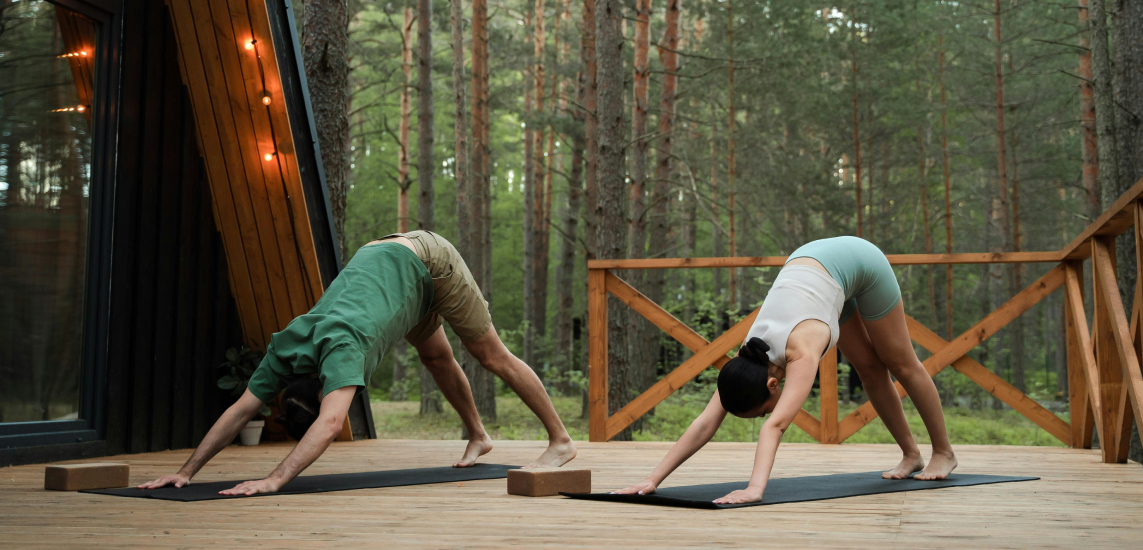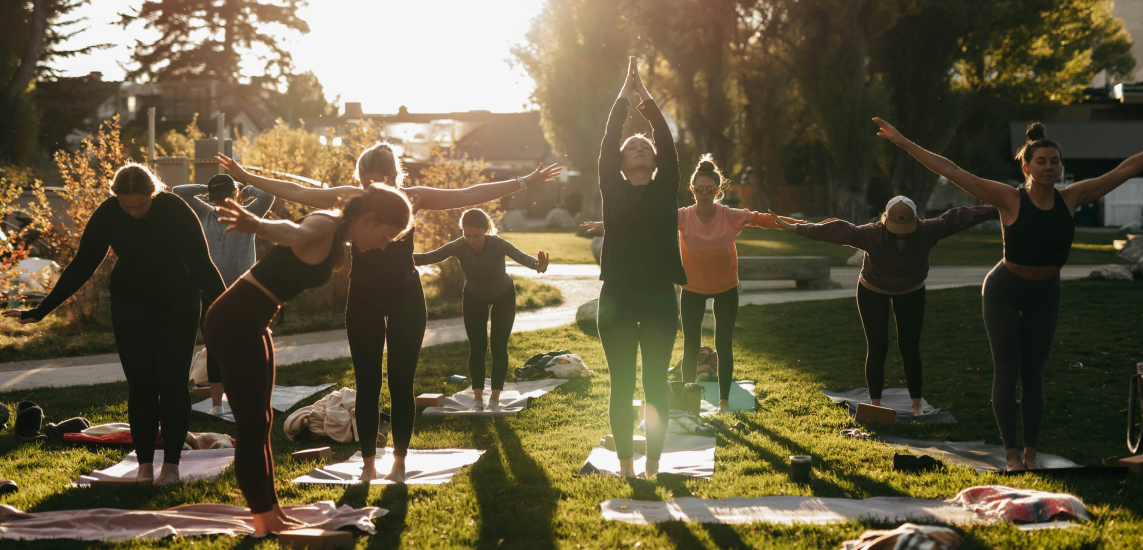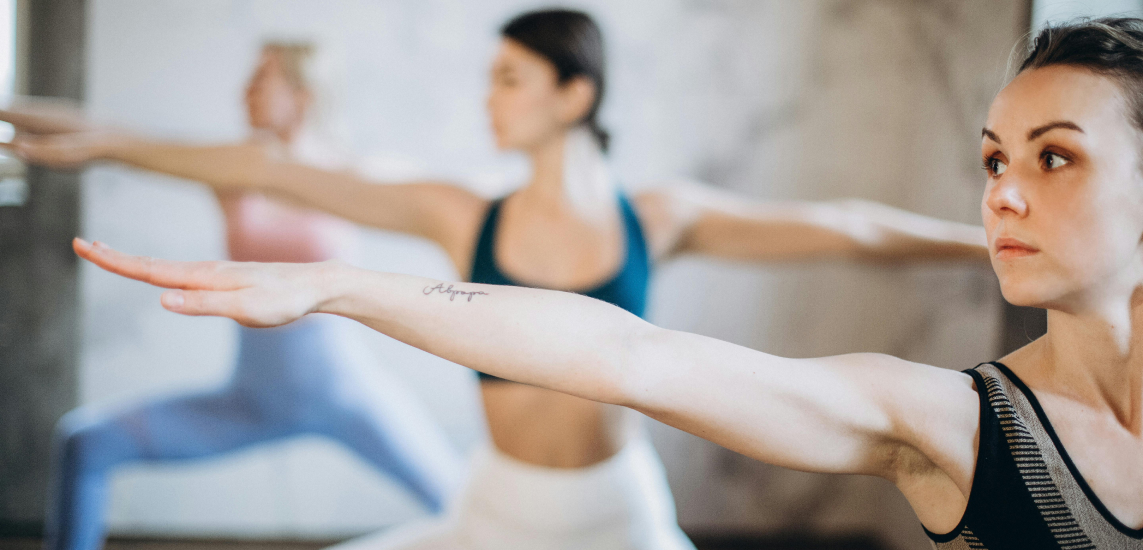This article was created using personal insights from Insight Timer’s meditation teachers.
Yoga retreats have become a popular way to break from the busyness of everyday life, offering time for self-reflection and personal growth. Whether you’re a beginner or an advanced yogi, you can deepen your yoga practice, find relaxation, and enhance your well-being by attending a retreat.
In this article, we’ll explore what happens on a yoga retreat, the benefits of attending one, and how to choose the right retreat for your needs. Let’s dive in!
Key takeaways
- Yoga retreats provide a unique opportunity to immerse in yoga and mindfulness, away from daily distractions, fostering deeper personal growth and relaxation.
- Disconnecting from technology during a retreat helps participants reconnect with themselves, promoting mental clarity and self-awareness.
- The supportive community aspect of retreats allows you to meet like-minded people, build meaningful connections, and gain new perspectives on life.
- Many attendees leave feeling reenergized and connected with nature, which can have lasting impacts on their physical and mental well-being.
What happens on a yoga retreat?
A traditional yoga retreat brings people together to practice yoga and meditate, usually in a peaceful, natural location. It’s a break where participants can immerse themselves in yoga classes, guided meditation, and wellness practices, without the distractions of everyday life.
According to Pedro Luna, an Insight Timer meditation teacher,
“A yoga retreat is an invitation for you to step away from your daily life and take time for yoga, wellness, culture, and community.”
He adds that retreats often include “1-2 yoga classes per day” as well as special workshops like “partner yoga, breathwork, and meditation workshops.”
There are many different types of yoga retreats, each offering a unique experience:
- Luxury retreats: Offer spa treatments, gourmet meals, and deluxe accommodations.
- Budget retreats: Provide a more affordable experience with basic accommodations, still focusing on yoga practice and meditation.
- Silent retreats: Focus on self-reflection and mindfulness, with limited or no talking allowed.
- Adventure retreats: Combine yoga with outdoor activities like hiking, mountain biking, or surfing.
Participants also get to explore different styles of yoga, including kundalini, hatha, and vinyasa, depending on the retreat. These experiences allow you to expand your yoga knowledge while finding new ways to connect with yourself and others.
The 6 benefits of attending a yoga retreat
Going on a yoga retreat offers numerous benefits that go beyond improving your physical yoga practice, like finding mental clarity and building meaningful connections. We’ll explore each benefit in detail below.
Deepen your yoga practice
While attending a yoga class every now and then is certainly beneficial, a one-hour class has its limitations—seeing meaningful progress can take months if not longer. A yoga retreat offers a more potent way to take your practice to the next level. Ewelina Zablocka, an Insight Timer teacher from Purna Yoga Bali, explains that retreats help deepen the understanding of yoga as “a lifestyle, not just a physical practice” which helps expedite your personal growth.
Pedro echoes this sentiment, noting,
“By immersing in your practice away from your daily life, you allow the energy of the practice to settle in. You get to move at a more leisurely pace and let the practice really be a way of life.”
With guidance from expert yoga teachers, retreats provide an immersive environment that facilitates transformation you may not otherwise achieve from yoga classes alone.
Disconnect to reconnect with yourself
In our tech-driven world, it’s rare to find time completely free from screens and notifications. Yet, disconnecting from technology is one of the best ways to become more present and grounded.
Because yoga retreats require us to step away from our devices, they offer an opportunity to deeply connect with the inner self. Pedro Luna emphasizes the importance of this digital detox:
“Taking time away from technology and doom scrolling gives retreaters an opportunity to pause and reset.”
Similarly, Ewelina Zablocka notes that disconnecting from technology “helps participants reconnect with themselves by eliminating constant distractions and mental clutter.” Without the usual noise of texts and social media, retreaters can fully focus on their inner experience, allowing for self-reflection and mindfulness.
Looking to combat digital stress? Change your relationship with technology through guided mindfulness.
Meet like-minded people
One of the most rewarding aspects of a yoga retreat is the opportunity to meet and bond with like-minded people who share your passion for wellness and self-care. Ewelina highlights the power of community in supporting personal transformation:
“Sharing experiences and insights with others enhances your own practice and inspires growth. The connections formed often lead to ongoing inspiration and accountability long after the retreat.”
Many participants even develop lasting friendships with people they meet during retreats!
Connect with nature
Many yoga retreats are held in beautiful, natural locations, whether it’s the lush jungles of Costa Rica, the serene beaches of Bali, or the mountains of India—offering the perfect opportunity to connect with the land around you. According to Ewelina, the environment plays a crucial role:
“A peaceful, natural setting helps participants disconnect from daily stressors and distractions, creating a space for deep relaxation and reflection.”
Research confirms that spending time in nature has clear benefits for our emotional and cognitive functioning, including reducing stress and anxiety and boosting creativity.
Rest and rejuvenate
One of the greatest benefits of attending a yoga retreat is the chance to rest and recover. As we dive deeper into yoga and meditation, we create space within our bodies and minds, allowing us to recharge like never before. In this more relaxed state, we’re more likely to gain new insights that shift our life experiences.
Pedro notes that after completing a retreat, participants often return home with a “more balanced and clear” state of mind, having “shed the weight of past stressors.” Ewelina agrees, adding that the combination of yoga, meditation, and nature fosters mental clarity and emotional balance. She shares:
“Participants often leave with greater clarity, having gained insight into their life’s direction and priorities.”
Some even notice improvements in their physical health and overall well-being that last long after the retreat is over.
Create lasting mindfulness habits
Yoga retreats provide an ideal environment for building long-lasting mindfulness and meditation habits. Pedro shares how the routines developed on a retreat continue to benefit participants long after they return:
“When you’re feeling good and connected, you want to keep that feeling. The habits we establish on a retreat spill over into our everyday lives.”
In other words, it’s easier to keep the momentum going after a retreat than trying to establish a mindfulness habit on your own.
How to choose the right yoga retreat for you
Choosing the right retreat is essential for getting the most out of your experience. Here are a few tips to help you find the perfect retreat for your needs:
- Location: Consider how far you’re willing to travel for a retreat and the type of scenery you’d like to be surrounded by.
- Teachers: Research the yoga teacher(s) hosting the retreat to ensure their style aligns with your goals. As Pedro notes, “You should consider the teacher and make sure they are the right vibe for you.”
- Level of practice: Look for a retreat that matches your current skill level, whether you’re a beginner or advanced.
- Type of yoga: Different retreats focus on different styles of yoga, such as hatha, vinyasa, or ashtanga. Be sure to select the style that resonates with you.
- Budget: Keep your budget in mind when selecting a retreat. Some retreats offer luxury accommodations, while others are more affordable with simpler facilities.
The best yoga retreats will have the above information readily available on their websites or listings, ensuring potential participants have everything they need to make the right choice.
Discover top yoga retreats with Insight Timer
Insight Timer’s retreat marketplace offers access to exceptional retreats guided by renowned teachers. Explore life-changing experiences suited for every skill level, from beginner programs to advanced workshops in yoga and meditation. These retreats are thoughtfully crafted to enhance your practice, promote relaxation, and build a sense of mindfulness and community.
Need ongoing support on your path? Stay motivated and engaged with Insight Timer’s 25,000+ groups, where you can connect with a vibrant community of yogis and continue your journey both online and in person.
Benefits of a yoga retreat FAQs
What is the goal of a yoga retreat?
The primary goal of a yoga retreat is to provide an immersive environment where participants can deepen their yoga practice and focus on personal well-being. Retreats offer a space for self-reflection, relaxation, and mindfulness, helping participants reset their mental and physical health.
Can a beginner go on a yoga retreat?
Yes, many yoga retreats are designed for beginners, offering introductory mindfulness and yoga classes. It’s important to choose a retreat that aligns with your skill level to ensure a positive experience.
What does a yoga retreat include?
A typical yoga retreat includes daily meditation, yoga classes, nourishing meals, and opportunities to connect with nature. Some retreats offer additional activities like hiking, spa treatments, or mountain biking.
How long do yoga retreats last?
Yoga retreats can vary in length, from weekend getaways to week-long or even month-long programs. The duration depends on the retreat center and the type of retreat offered. First-timers should consider attending shorter retreats (up to a few days max).
Are there different types of yoga at retreats?
Yes, many retreats offer different styles of yoga, including hatha, vinyasa, kundalini, and ashtanga. This variety allows participants to explore different approaches to their yoga practice. Most retreats list the style of yoga they offer in their descriptions.
How do I prepare for a yoga retreat?
To prepare for a yoga retreat, it’s helpful to establish a regular yoga and meditation practice ahead of time. You can use the Insight Timer app to build these habits, so you’re ready for the immersive experience of a retreat.
What’s the difference between yoga retreats and wellness retreats?
While both types of retreats focus on health and well-being, yoga retreats are primarily centered around daily yoga practice, meditation, and deepening your connection to yoga philosophy. They often include multiple yoga classes per day and workshops on topics like breathwork or mindfulness.
Wellness retreats (or wellness resorts), on the other hand, offer a broader approach to health, incorporating activities like spa treatments, nutrition workshops, fitness sessions, and holistic healing practices. A wellness vacation may not always focus on yoga but rather on overall rejuvenation and lifestyle transformation.
References
Bratman, G., C. Daily, G., J. Levy, B., & J. Gross, J. (2015). The benefits of nature experience: Improved affect and cognition. Landscape and Urban Planning, 138.







